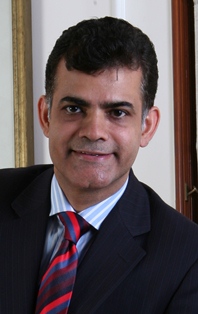 I’ve reached Davos and am eagerly anticipating the start of the World Economic Forum tomorrow. The WEF 2014 theme – ‘The Reshaping of the World: Consequences for Society, Politics and Business’ – is intriguing. Jones Lang LaSalle, as strategic partner to the WEF, will particularly focus on fostering a new appreciation for the role that real estate plays in reshaping the world’s geography.
I’ve reached Davos and am eagerly anticipating the start of the World Economic Forum tomorrow. The WEF 2014 theme – ‘The Reshaping of the World: Consequences for Society, Politics and Business’ – is intriguing. Jones Lang LaSalle, as strategic partner to the WEF, will particularly focus on fostering a new appreciation for the role that real estate plays in reshaping the world’s geography.
It’s cold here – very cold. The wind that blows over the picturesque mountains is icy, and it bring a message of change with it… a change that we all hope to see as a result of the deliberations that begin from tomorrow. India is far away, but my thoughts today have never been closer to my country. I’m also thinking of a power ballad by the Scorpions that was all the rage in the ’90s, which went “the wind of change blows straight into the face of time…”
The images that are called forth in many people’s minds when they think of real estate’s role in reshaping the world are not necessarily pleasant. One tends to think of concrete jungles, skyscrapers jostling for space on city skylines, vanishing green cover and open spaces… and yes, we can’t just wish those ground realities away.
But it is also true that a more aware and concerned consciousness now guides the world. This consciousness has taken a hard look at the past, and is determined to make a change. In the future, it is not mercenary exploitation and depletion of land and natural resources that will guide the path of real estate.
The world has had a long era of that crass and thoughtless model, and is paying the price. But a new, forward-looking way of thinking and acting prevails today. This new way of thinking can and will gradually but surely make our world’s cities better places to live and work in. We are already seeing this change in the developed world, and India is by no means a mute bystander.
A decade ago in India, nobody talked of green residential buildings, sustainable office spaces and the need to put infrastructure before building development. In our larger cities, urban planning was a weak good intention with no force of policy-level implementation to drive it. Now there is change happening – we all see it, but aren’t very impressed as yet because it is such a slow process. Nevertheless, I am more than hopeful than ever today.
It takes a long time to bring a rampaging bulldozer headed in the wrong direction to a halt, and then put it on the right track. This bulldozer took a long time to build up speed, and its forward momentum – coupled with its incredible mass and the combined strength of the forces that fuelled it – will need slow down gradually.
Luckily for India, the new way of thinking sustainably took greater hold at a time when the country’s real estate sector was slowing down for other reasons. There is no better and more effective brake for the real estate sector than an economic slowdown.
This year, we are once again on the path of economic revival – but a new awareness now prevails on our real estate market. Regulations that have been mouldering in bureaucratic drawers for ages are being dusted off with a clear view to implementing them. The sector groans in the throes of change aversion, but a new age of regulated real estate development is nevertheless at hand.
I’m talking of mandatory reservations for LIG housing in large townships. And of stronger rules for the maintenance of open spaces and green zones. And of a rapidly growing demand for sustainable workplaces and homes…demand that is already yielding more supply of the right products all over the country. And of a determined drive by our Government towards bringing this largely unregulated market into the folds of documented transparency. And of the rapidly weakening strangleholds that corrupt politicians have for so long had on the sector.
In terms of regulation, sustainability and overall inclusiveness, India’s real estate market is a long way from being comparable to countries like England, Germany and Switzerland. But the wind of change is blowing… I feel it ruffle my hair every time I look out of the window at an environmentally sustainable office complex coming up in Bangalore. It rattles the newspaper pages every time I read about another illegally constructed housing project being demolished in Mumbai, or FSI norms being stretched.
It blows across the balconies of Indians who have spurned the polluted inner cities and now live in the cleaner, greener environs of new, better-planned suburbs. It blows across newly-laid railway tracks and speedways that allow them to reach work despite this brave choice. It buffets the windows of office buildings than consume less resources and deliver more in terms of efficiency. In India, the wind of change is perhaps still just a breeze, but it is picking up velocity.
I look in the future and see a new India unfolding, and this India fits very well into the concept of a reshaped world. We are here today because India has an important place in the larger global picture. We are here to be witnesses to and participants in the evolution of economies like ours. And more than ever, I’m proud to be an Indian. “The future’s in the air, I can feel it everywhere – blowing with the wind of change…”
